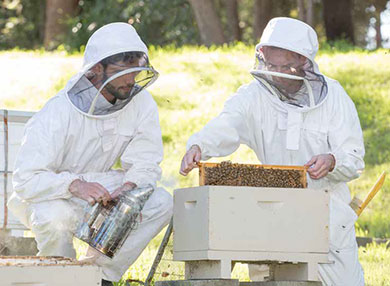Leaders in life science research
Our biological sciences researchers are shaping the future with research into bionic brains, superbugs, invasive fruit flies, shark behaviour, conservation of endangered wildlife and more.
 Macquarie is renowned for its world-leading research across all biological disciplines.
Macquarie is renowned for its world-leading research across all biological disciplines.
Our School of Natural Sciences and Department of Applied Biosciences look at complex questions from multiple perspectives, offering a dynamic and supportive environment for generating creative, relevant and high-impact research.
Areas of specialisation
- Biochemistry and cell biology
- Cell metabolism
- Enzymes
- Proteomics and intermolecular
- Interactions (excl. medical proteomics)
- Receptors and membrane biology
- Synthetic biology
- Bioinformatic methods development
- Bioinformatics and computational biology
- Ecology
- Evolutionary biology
- Genetics
- Genomics
- Industrial biotechnology
- Bacteriology
- Microbial ecology
- Microbiology
- Plant biology plant physiology
- Animal behaviour
- Animal neurobiology
- Animal physiological ecology
- Invertebrate biology
- Vertebrate biology
- Zoology.
Research collectives
Research highlights
Born from the brain of a bee – The Macquarie Minds and Intelligences Initiative is a cross-disciplinary research program which seeks to unravel the complex mysteries of intelligence and the mind. Research brings together expertise in cognitive science, neuroscience, philosophy, anthropology, ethology and computer science in order to better understand the mind and apply this knowledge to everyday living.
Cane toads – Professor Rick Shine, winner of the Prime Minister's Prize for Science in 2016 and author of The Cane Toad Wars, is applying his deep ecological knowledge to tackle the problem of cane toads as they continue their deadly march across the Australian landscape. Partnering with Mindaroo Foundation, he aims to disrupt the development of cane toads before the tadpoles can even leave the pond.
Community engagement – Macquarie is investigating antibiotic resistance through a unique citizen science project undertaken in partnership with Taronga Zoo and the University of Sydney. Associate Professor Michelle Power, by engaging everyday Australians, has shown that antibiotic resistance is spreading among Australia's native animals.
In addition, the nature of the project is such that the general public are learning more about the scientific process and the work done by scientists in their everyday work. Michelle's work has shown that exchanges of pathogens between people and animals poses a significant risk to both. More than 3000 people took part in the study.
Research news
Read more about the breakthroughs happening in the areas of research relating to biological sciences.